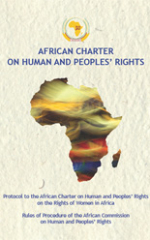Pocket-size commemorative edition on the occasion of the 30th anniversary of the adoption of the African Charter on Human and Peoples’ Rights 1981 - 2011

Pocket-size commemorative edition on the occasion of the 30th anniversary of the adoption of the African Charter on Human and Peoples’ Rights 1981 - 2011
2011
ISBN: 978-0-9869857-5-1
Pages: 87
Print version: Available
Electronic version: Free PDF available
| File Size: | 439.39 KB |
| File Type: | application/pdf |
| Hits: | 12997 Hits |